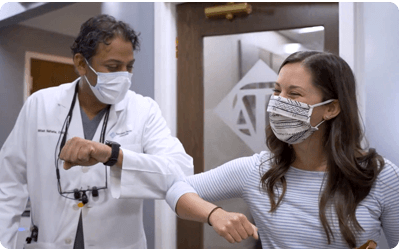Key Points About Sleep Apnea Treatment
- Tewksbury Dental Associates offers a free 15-minute teleconference consultation to evaluate whether you may benefit from sleep apnea treatment.
- They highlight that Obstructive Sleep Apnea (OSA) — where airway obstruction interrupts breathing during sleep — is common and often undiagnosed.
- Our office can provide a simple take-home sleep test and have it interpreted by a licensed sleep physician to diagnose OSA.
- For many patients, a custom oral appliance (rather than CPAP) is offered to reposition the lower jaw — helping keep the airway open during sleep.
- Our oral appliances are durable (lasting 3–5 years with care) and often better tolerated than over-the-counter “boil-and-bite” guards, making them a safe, effective treatment option.
Do you, or your partner snore?
Is snoring and sleep apnea impacting your quality of life?

Take the Sleep Test
FREE Sleep Apnea/Snore Consultation
Are you looking for sleep apnea treatment options near you? At Tewksbury Dental Associates we believe everyone deserves healthy sleep and live a well-rested life!! We offer sleep apnea consultations for new patients that are 15 minutes and conducted via teleconference.
Your consultation will help us determine:
- If you’re a candidate for a particular treatment
- What your long-term expectations are
- How we can help you meet those needs
- Whether you’re ready to start planning for actual treatment
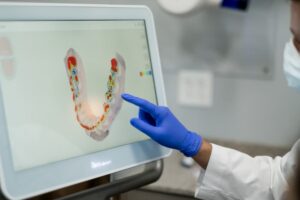
What is Obstructive Sleep Apnea?
Obstructive Sleep Apnea (OSA) can occur when the upper airway becomes obstructed, causing an absence of breathing for 10 seconds or more. Because OSA occurs during sleep, it is not easily self-diagnosed, and is far more prevalent than previously believed. OSA usually results when the back of the tongue and the back of the soft palate come together during sleep, forming a seal that does not allow air to pass into the trachea.
Prevalence
- 1/50 Americans suffering from OSA are undiagnosed
- 1/3 of people over the age of 15 are at risk for OSA
- Estimated 18 million Americans have OSA
Why is this important?
Patients with OSA have an increased risk of the following:
- Hypertension
- Cardiac Arrhythmias
- Congestive Heart Failure
- Stroke
- Mood Disorders
- Sexual Dysfunction
- Slower reaction time
- Memory loss
- GERD (Acid Reflux)
- Weight gain
How Does Sleep Apnea Treatment Work?
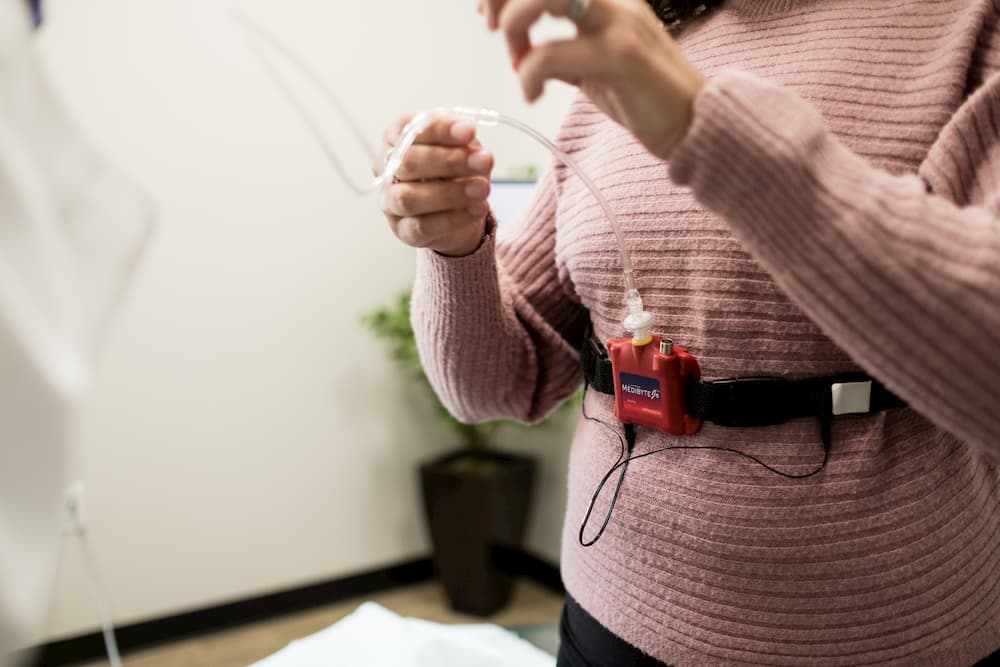
OSA deprives the body of two very important things: Sleep and Oxygen.
- Depriving the body of sleep means your body doesn’t enter into the reparative and regenerative stages of deep sleep that it needs to rejuvenate you for the morning. Yes, you may be sleeping through the night, but the constant obstructions do not allow your body to fall into the deeper stages of sleep when these important processes occur. These can regulate everything from mood, to appetite/weight control, to cognition and memory.
- Starving your body from oxygen has a variety of consequences as well. Some obstructions last as long as 2 minutes. In rare cases, some last even longer! Are you able to consciously hold your breath for 2 minutes? We’re not, but some of our patients do in their sleep! When you don’t breathe for a prolonged period of time, your blood doesn’t carry as much oxygen as it should. If each pump of the heart isn’t delivering as much oxygen to the rest of the body, then the rest of your body is going to demand more pumps from your heart. This is exactly what happens. The problem? Your heart is a muscle too, that needs oxygen. As it pumps more, its demand for oxygen increases, which can lead to many of the cardiac issues discussed previously. It comes as no surprise that these can have a serious affect on your overall health and longevity.
Do I have Sleep Apnea?
The first step to treatment is always diagnosis. There are a number of signs and symptoms that we look for in your mouth that are key indicators of OSA. There are also parts of your daily life that may give us hints that you’re not sleeping as well as you could be. A clinical exam and questionnaire can help guide us to further testing if necessary.
If we are concerned that you may be suffering from OSA, a simple take-home sleep test can be given to you, right in our office. Bring it back to the office the next day, and we will have it interpreted and analyzed by a licensed sleep physician who can make a diagnosis and recommendation.
How does Sleep Apnea get Treated?
There are a few ways to treat OSA. Two of the most common methods are Continuous Positive Airway Pressure (CPAP) and Oral Appliance Therapy
CPAP works by inflating the upper airway with constant air pressure. This breaks the seal formed by your tongue and soft palate and allows air to continue down the trachea to the lungs. For those who can tolerate it, this is a very effective treatment. Many patients however do not tolerate it well.
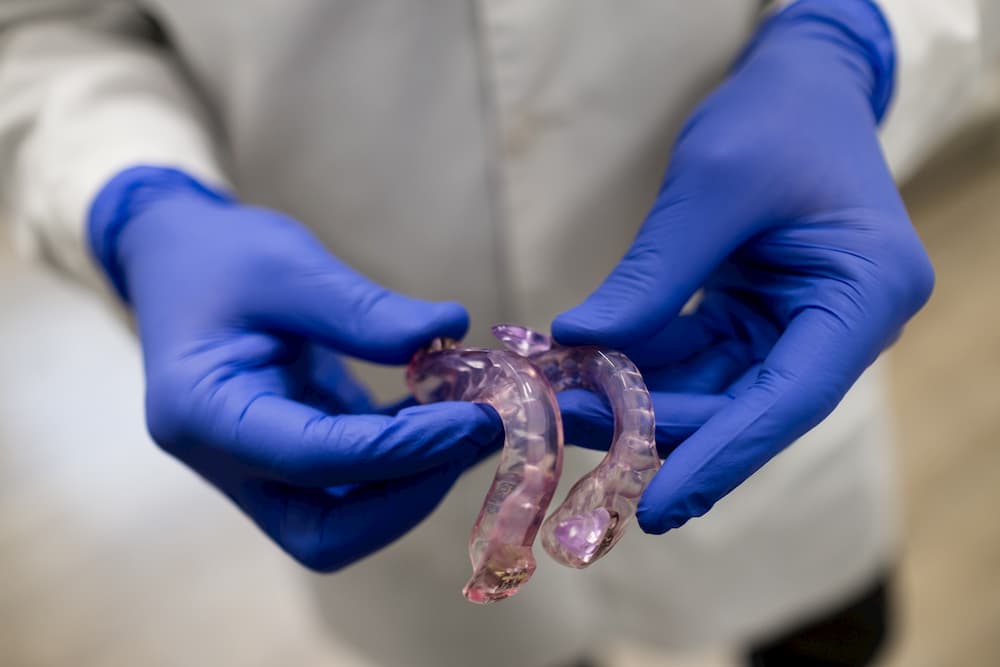
An Oral Appliance for OSA resembles an upper and lower night guard. The two are often connected in such a way that advances the lower jaw forwards. Since the tongue is attached to the lower jaw, this pulls the tongue away from the back of the throat and opens the upper airway. This is very effective for mild or moderate sleep apnea and, in general, is very well tolerated.
There are other surgical and orthodontic long-term solutions as well. Generally, initial treatment begins with one of the two options above, but we are happy to discuss alternatives if you wish.
Ask us if you, or your bed partner, snores or doesn’t sleep well. We are here to help!
OSA/Dental Sleep Apnea Appliance FAQ
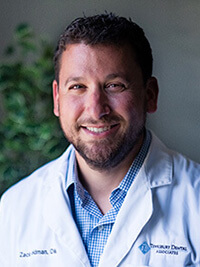
Content Reviewed and Approved by Dr. Goldman.
Dr. Zachary Goldman, a native of Andover, MA, graduated from Colby College, Magna cum Laude, with a BA in Biochemistry and a minor in music. He earned his doctorate from the University of Connecticut School of Dental Medicine. After completing a one-year hospital-based dental residency at Saint Francis Medical Center in Hartford, CT, Dr. Goldman moved back to Massachusetts and currently lives with his wife in Boston.

